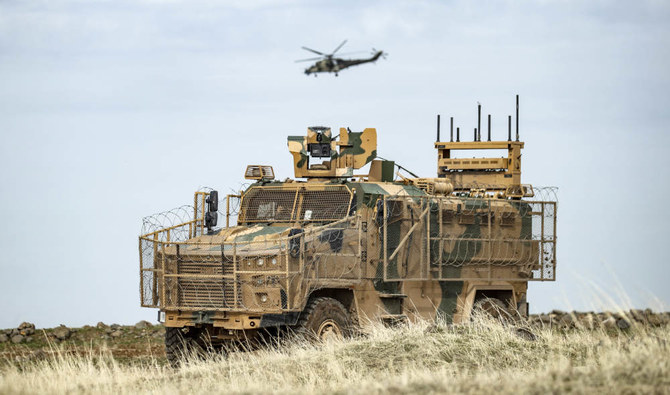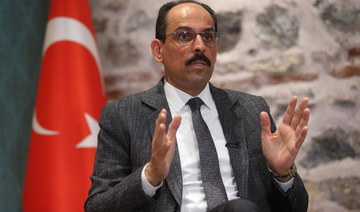ANKARA: As part of its countrywide counterterrorism operations, Turkey has arrested a suicide bomber allegedly linked to Daesh who was planning an attack in the southeastern province of Urfa, bordering Syria.
Bashar Al-Mizhen, codenamed Abi Enes Al-Kathani, has confessed to the authorities.
Mizhen, who joined Daesh in 2015 and received special arms training from the terror group, was allegedly preparing the attack in coordination with the Damascus branch of Daesh.
He is the 10th terrorist caught this year on Turkish soil. The authorities seized several digital materials and are currently examining various organizational documents belonging to the terror group.
FASTFACT
Bashar Al-Mizhen, codenamed Abi Enes Al-Kathani, has confessed to authorities.
Daesh members have carried out a number of attacks against Turkey, including at least 10 suicide bombings, seven bombings, and four armed attacks, which killed 315 people and injured hundreds of others.
Last year, Turkey also arrested a Daesh terrorist identified as the right-hand man of the late terrorist leader Abu Bakr Al-Baghdadi.
In the first quarter of this year, dozens of Daesh members, including the sons of its top officials in Iraq, were caught in several Turkey cities, including Urfa, the northern province of Samsun and the western province of Izmir.
Last month, Turkey’s intelligence agents also caught two Daesh terrorists who were planning attacks against the country’s troops on home soil and in Syria.
Nihat Ali Ozcan, a retired major now serving as a security analyst at the Ankara-based think tank TEPAV, said such operations are held consecutively because one operation feeds another with the intelligence data that is gathered.
“Within its territories, Turkey hosts about 3.7 million unregistered Syrian refugees right now. Adding the unregistered refugees and those who are settled in the safe zones in northern Syria, this number has reached 7.5 million,” he told Arab News.
“We cannot assume that all of them are innocent people,” he said.
“There are several Daesh sympathizers among them. All immigrant-receiving countries are at the same time importing the domestic problems of their countries of origin,” said the retired major.
“In Turkey, one can identify several kinds of economic, cultural and security-related challenges that Syria has exported along with several ideological(ly-driven actors who are in competition with one another),” Ozcan added.
There are about 430,000 registered Syrian refugees in Sanliurfa, making the city the fourth-largest host of displaced people after Istanbul, Gaziantep and Hatay.
Ozcan also underlined the impact of faith-based actors in Sanliurfa, including tribes and clans that have linguistic, religious, and kinship ties with Syrians, which also feed this security eco-system and boost the sympathizer base of Daesh in this city.
Experts have emphasized that any attack plan of Daesh, including its timing and scope, is related to its own organizational dynamics, and should be considered a reminder of how dangerous the current situation in neighboring Syria and Iraq is, as the terrorists move across borders to fulfill their wider objectives.
“Daesh acts according to its own rationale. It uses terror to influence great masses, (send) message(s) to the political actors and show(s) … the world that it steps up efforts to bolster its presence in other regions as well,” Ozcan said.
Daesh still retains a significant presence in northern Iraq and Syria, as shown by one of the biggest assaults in years, which was the prison attack in the Kurdish-controlled northeast Syrian city of Hasakah in January that left hundreds dead and allowed several prisoners to escape.
In April, two Iraqi soldiers were killed and two others wounded in an attack by Daesh in the western Anbar province, while seven Peshmerga and three civilians were killed in another Daesh attack in northern Iraq in December 2021 — an assault that was condemned by Turkey.
“Several years ago, Daesh seized huge (swathes) of Iraq and Syria. Today, despite its significant loss of a territorial base, the terror group still struggles to maintain its existence through new tactics,” Ozcan said.
The global coalition against Daesh, which was formed in 2014 and now includes 84 states and international organizations, gathered last Wednesday in Morocco to coordinate efforts against any resurgence of the extremists in the Middle East and North Africa.
“Over the last several years, Daesh has been considerably weakened in Iraq and Syria, but it remains a threat, seeking any opportunity to reconstitute itself,” senior US diplomat Victoria Nuland said during the meeting.
Daesh recently urged its sympathizers to take advantage of the ongoing war in Ukraine to stage new attacks against European nations.

























